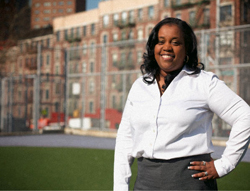Leadership under Fire
Leadership under Fire
In 1999, when Barbara Freeman became principal of P.S. 161 on West 133rd Street in Harlem, the school had been languishing for six years on the state’s list of Schools Under Registration Review (SURR). Just 24 percent of its mostly Latino students were proficient in math and only 11 percent in English Language Arts.
Freeman, who is African American, didn’t speak much Spanish, but the city, which was jumpstarting reform in SURR schools, tapped her for her experience working as an assistant principal at struggling schools in the South Bronx and Brooklyn’s Bedford-Stuyvesant neighborhood. Tough and smart, she also has an easy laugh and the ability to listen to others’ concerns.
Freeman made good headway at 161, but a year into her efforts, she knew there was a still a long way to go. Then the city proposed turning the school into a charter, to be managed by Edison Schools, a private company. Freeman convened the school community to discuss the impending change, but stayed publicly impartial so parents could decide what would be best for their kids.
The result was gratifying. The school community mobilized itself to keep 161 in city hands and under Freeman’s leadership. Parents organized to fight the plan and became involved in school issues. Teachers began tutoring kids during cooperation periods and at lunch.
When it came to a vote, parents rejected the Edison takeover. Better still, they stayed committed to all the new efforts they had set in motion.
Today, 86 percent of students at the school—officially known as P.S./M.S. 161 Pedro Albizu Campos—are proficient in math, and 70 percent are proficient in English.
“That incident hastened reform by five years,” says, Freeman, who is now pursuing a doctorate in educational leadership at TC.
Since then, she has implemented reforms focused on accountability, teacher quality, and development of the school’s transitional bilingual program to increase the focus on learning English. The latter priority has required particular diplomacy.
“The last thing I wanted parents and teachers to think was that an African-American principal is coming in, not really validating their culture and their instructional way of their kids, and dismantling a lot of things,” she says. “However, the programs weren’t working. So it was my job to show them how they were not working.”
During 2006, Freeman honed her leadership skills in the Cahn Fellows program, focusing on the adjustments that 161 has needed to make as it has added grade 7 and planned for the addition of grade 8.
“How strategically you use your leadership became a big eye-opener for me,” says Freeman. Now she’s working to improve her school at a time when test scores are up, and pressures for change aren’t coming from downtown. By studying at TC while continuing to lead at P.S. 161, she’s able to see how theory plays out in practice several blocks north of campus on West 133rd Street.
“I’m happy with my school and the progress that it’s making,” says Freeman. “It’s ever-evolving, which keeps it fresh.”
Published Wednesday, May. 19, 2010
